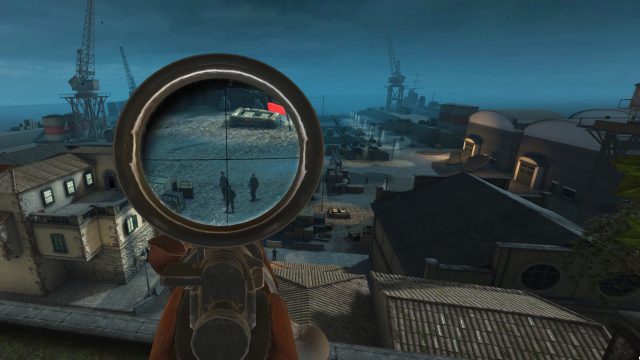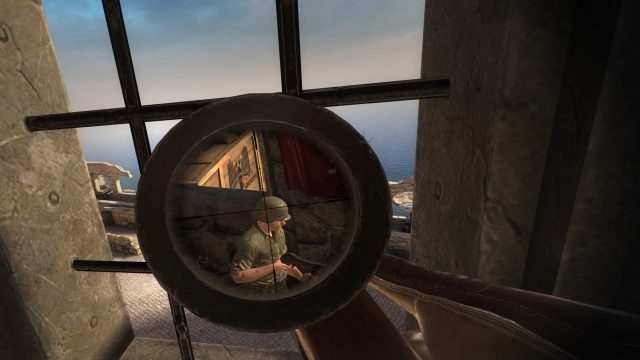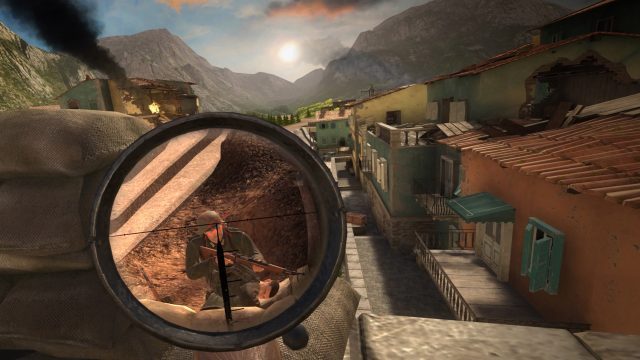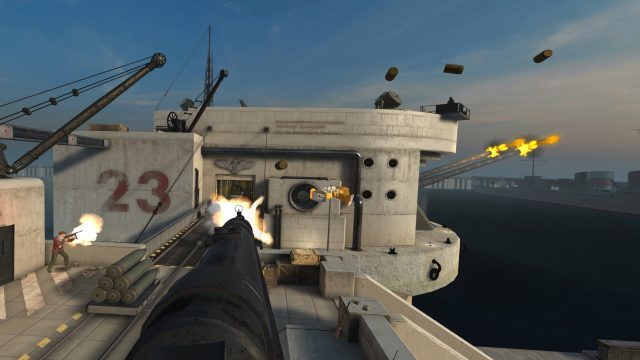The Entire VR Industry in One Little Email
The Daily Roundup is our comprehensive coverage of the VR industry wrapped up into one daily email, delivered directly to your inbox.
Sniper Elite VR is the first made-for-VR game in the long running franchise. True to its name, the game delivers satisfying sniper gameplay, including its signature x-ray kill cam. But beyond that, the war stories aren’t worth writing home about.
Sniper Elite VR Details:
Gameplay
Sniper Elite VR is the second major single-player WWII VR game to come to VR, not long after Respawn’s Medal of Honor: Above & Beyond (our review). The game centers around an Italian resistance fighter who is recounting his war stories.
First and foremost, Sniper Elite VR is, of course, about sniping. And to that end, the developers did a fine job of translating the feeling of the franchise’s signature sniping action into VR. Specifically, the game features perhaps the best looking and most usable sniper scopes that I’ve seen in any VR game to date. Combined with an essential ‘focus’ slow-motion feature which allows you to zoom in further for precise shots, the sniper rifles generally satisfy with just enough challenge to remain engaging.
The cherry on top for the game’s sniping is the franchise’s signature x-ray kill cam that occasionally gives you an up-close and inside look at exactly what parts of the enemy you just obliterated. Seeing bone and teeth flying after hitting an annoying enemy is gruesomely satisfying.
That being said, within the first level I had to turn down the frequency of the kill cam one or two notches to prevent it from happening too frequently that it became annoying. Props to the developers for making this an option.
So, the core sniping mechanics are pretty solid, but Sniper Elite VR unfortunately doesn’t create a particularly rich sandbox for you to play within. The game’s levels are immensely unforgettable due to the game’s inability to offer up more than a handful scenarios, leaving the game feeling like shooting gallery after shooting gallery. There’s some close-quarters combat sprinkled throughout, but the close-range weapons weren’t paid quite as much attention as the sniper rifles and end up lacking punch.
When it comes down to it, Sniper Elite VR shares a surprising number of flaws with its other WWII VR brethren, Medal of Honor: Above & Beyond. Specifically, the game lacks meaningful differentiation between weapons and enemies.
There’s four classes of weapon within the game, Sniper, Pistol, SMG, and Shotgun. Shotgun can basically be written off because they’re sluggish and get you too close to the game’s enemies (which kill you frustratingly fast at shotgun range). Pistols are largely useless as well, save a single silenced pistol that you get about 25% into the game, which makes it possible to kill enemies without alerting anyone nearby.
Then there are snipers and SMGs. Both are useful as a class of weapon, but I couldn’t find any meaningful difference from one sniper to another or one SMG to another. Among snipers, the only difference I could really see was that one of them had a six-bullet magazine while the others had five. With no discernable reason to pick one over the other, the six-bullet sniper was the obvious choice for the entire game… right up until I found the seven-bullet silenced sniper (which almost felt like a cheat because you can always shoot it without alerting anyone else).
Enemies have the same issue as the weapons… there’s practically no difference between them, no reason to prioritize one over the other, and no reason to change the weapons used against them. Once you’ve shot one guy in the head, you’ve basically seen it all.
The game tries to mix things up with the occasional armored vehicle, but they turn out to me more of a nuisance than an interesting challenge, as they are all taken out by shooting at the same weak points.
With solid sniping not backed up by unique weapons, enemies, or combat scenarios, Sniper Elite VR ultimately feels unmemorable, especially given its dull story. At just under six hours to complete the game, the gameplay felt like it had overstayed its welcome by the end.
Immersion
Sniper Elite VR does a few things well for immersion but a lot of things poorly. Ultimately it doesn’t create a deep sense of presence, but I was at least impressed with the graphical presentation on Quest 2, which struck me as surprisingly good and relatively uncompromising, while maintaining seemingly perfect performance.
Gun handling is reasonably detailed. All guns are manually reloaded (this can be optionally disabled in the options), which involves placing a magazine into the gun and racking the charging handle. Things can feel a bit wonky at times with hand and grip poses on many guns that don’t seem to line up to the controller’s handle very well.
The game uses a holster system that has six weapon slots: two over-shoulder, two chest, and two hip. There’s also an ammo pouch and two grenade slots around the waist. From my time playing the game, I felt the holster system had too many slots, making it easy to misplace an item because it got put in the wrong slot, or accidentally replace one item for another, causing the first to drop to the ground. At a minimum, the over-shoulder slots felt very reliable, which is good because that’s where your primary weapons are.
While gun handling is decent, world interaction feels like a complete afterthought in Sniper Elite VR. The game’s idea of interacting with most objects is to reach your hand near them and pull the grip while watching a circle fill up and then something happens.
Beyond that, you’ll quickly learn that almost none of the objects scattered around the environment are interactive in any way, save for ammo boxes and explosive barrels.
Sniper Elite VR makes an attempt at a Half-Life: Alyx ‘select and pull’ method of force-grabbing objects, though it comes off as being far less polished. Object selection is hit-or-miss, with the system sporadically leaping between objects as a result of minor hand movements.
On top of that, the game almost seems to prefer force grab over directly reaching out toward objects, as it doesn’t make it particularly easy to do without gripping the precise interaction points.
I appreciate the game’s attempt at an immersive menu. Unfortunately it comes off a bit half-baked, with too much reliance on blatant HUD elements, and a mixture of immersive and non-immersive interactions (ie: page turning vs. ‘hold grip to start level’).
On its default settings, the game’s HUD is a serious detractor from immersion. Expect to see white rings around anything that’s interactive, a kill log popping up after every single kill, floating score counters popping out of dispatched enemies, text-based ammo counters, and a big red icon to show when a grenade is armed. Fortunately there’s a HUD option which lets you tone this down a few levels, or turn it off entirely. While I would have liked to turn it off entirely, it quickly becomes clear that the obnoxious HUD is there for usability reasons—reasons which have immersive solutions, but not in this game.
Also harkening back to Medal of Honor: Above & Beyond, a major flaw is Sniper Elite VR’s pace-destroying level structure. There you are, a soldier going through harrowing war scenarios, only to reach the end of a segment and see a ‘Mission Complete!’ screen pop up to give you a bunch of stats and a score before ejecting you back to a menu. This destroys any sense of tension or mood that the game’s story was attempting to build.
Speaking of the story… it’s an entirely forgettable affair—I honestly don’t know the main character’s name (maybe they never told me what it was?). It presents itself as a serious war story, but the game ultimately feels like a series of ‘go there, do that’ prompts, in which you’d have no idea what you were doing on a given level if you weren’t guided step by step.
Comfort
I found Sniper Elite VR to be entirely comfortable throughout, and was easily able to play for more than an hour continuously while using free movement with no blinders. I don’t recall a single point in the game that made my stomach lurch.
While the game offers a wide range of comfort options, the teleport implementation is so painfully slow that I simply couldn’t recommend the game to a player who can only play with teleport.
In my review copy of the game there seems to be a bug with height calibration which would constantly make me too tall, by an order of feet. I had to make regular use of the height recalibration which, oddly enough, seemed to make me taller when I crouched down low and strangely shorter when I stood up high.
The game’s holster belt could be a little annoying to reach at times when it didn’t want to track correctly, often rotating away from you when you wanted to look down to find a grenade to grab or to check the ammo counters on the ammo pouch.
Sniper Elite VR Comfort Settings – July 8th, 2021 |
|
Turning |
|
| Artificial turning | ✔ |
| Smooth-turn | ✔ |
| Adjustable speed | ✔ |
| Snap-turn | ✔ |
| Adjustable increments | ✔ |
Movement |
|
| Artificial movement | ✔ |
| Smooth-move | ✔ |
| Adjustable speed | ✔ |
| Teleport-move | ✔ |
| Blinders | ✔ |
| Adjustable strength | ✔ |
| Head-based | ✔ |
| Controller-based | ✖ |
| Swappable movement hand | ✔ |
Posture |
|
| Standing mode | ✔ |
| Seated mode | not explicit |
| Artificial crouch | ✔ |
| Real crouch | ✔ |
Accessibility |
|
| Subtitles | ✔ |
| Languages | English |
| Alternate audio | unknown |
| Languages | unknown |
| Adjustable difficulty | ✔ |
| Two hands required | ✔ |
| Real crouch required | ✖ |
| Hearing required | ✖ |
| Adjustable player height | ✔ |
Source: Read Full Article



